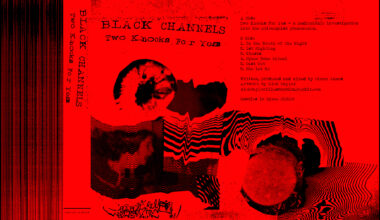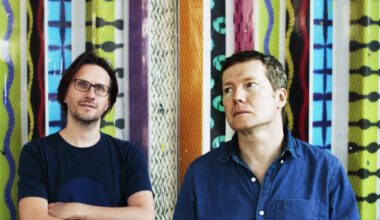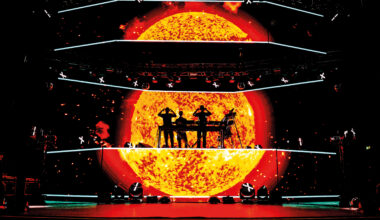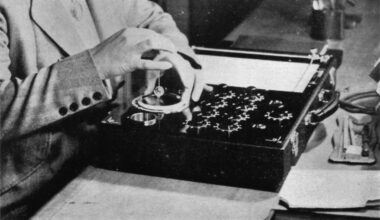Start blowing up the birthday party balloons. Planet Mu is 20 years old. That’s 20 years as one of the most consistently innovative and interesting electronic music labels in the world. And Mike Paradinas, full-time company boss and sometime μ-ZIQ man, is celebrating in style. Well, he would be if he had the time
“We could just get rid of the Internet, couldn’t we?” muses Mike Paradinas. “Well, we can’t, that was just a joke, but imagine how much money a record label could make without it. I like to think that in a parallel universe, something different has happened to the music industry.”
Mike Paradinas heads up Planet Mu, the label he founded 20 years ago, and he’s reflecting on the current state of things. Much has changed in two decades and record companies are running the risk of being a vestigial relic of an earlier time; technology has conspired against the humble record label as a means of getting music to the listening public, squeezing profit margins exponentially and spawning ever more creative attempts by surviving labels to extract cash from the wallets of willing punters.
So for all its intended irony, it’s not hard to have some sympathy with Paradinas when he talks about switching off the web.
Still, 20 years in business, however tough it might have been, is something to celebrate. Planet Mu has lasted longer than most marriages and the majority of life sentences. During that two decade stretch, Paradinas has released innovative records from a huge array of artists and been at the forefront of some of electronic music’s most interesting scenes. Ironically, given his comment above, he’s also pioneered the use of the internet’s many technological advances to the benefit of his signings.
The mid-1990s was when electronica went overground. Musicians and producers who had been slogging away since the early rave days suddenly found themselves getting the sort of profile they had previously only dreamed of. The big record companies started eyeing the talent pool hungrily.
As μ-Ziq, a name synonymous with the micro scene of left-of-centre electronic music that also included Aphex Twin and Autechre, Mike Paradinas was one such artist fêted by a major label. In his case it was Virgin, via the Hut imprint.
“I’d remixed several tracks for The Auteurs,” Paradinas explains. “Hut had put six of them on an album which did really well in the States, so they were quite anxious to release my stuff after that.”
Having previously put out material on Rephlex, Warp and Clear, Paradinas signed to Hut in 1994. In an effort to differentiate his work from the rest of the Hut roster – which consisted of the likes of The Verve and Embrace – and to utilise different specialist distributors, the Planet Mu label was created as a vehicle for Paradinas’ μ-Ziq work. His first Planet Mu release was the landmark 1995 ‘Salsa With Mesquite’ 12-inch, followed in 1997 by the ‘Lunatic Harness’ LP.
“Hut were a lot more hands-off than many major labels,” he says. “I had only good experiences with them, especially with Dave Boyd, who was my A&R man at Virgin and who headed up Hut, and having a label to release my music through really got my imagination going. I genuinely thought that if I had an imprint, then perhaps I could release records by other people. But the answer was no, I couldn’t.”

His recollection is followed by a dry laugh, casually masking what must have been a major disappointment for him back then. Persistence, however, paid off.
“Eventually they relented and I released a compilation called ‘Mealtime’, which had 10 other artists as well as me on there. Aphex Twin was on it. It was a compilation of drill ’n’ bass, which I think was what we called it then. It was meant to be an introduction to Planet Mu, but it was the only non-μ-Ziq release in the Virgin era.”
‘Mealtime’ nevertheless highlighted Mike Paradinas’ skill in recognising talent, something that has served him well in the years since.
“Most of the people on that album have gone on to bigger and better things,” he says, clearly proud of how ‘Mealtime’ showcased his curatorial chops.
Paradinas took complete control of Planet Mu in 1998, marking the start of his label as a fully independent operation. Far from there being a bust-up or some sort of complex boardroom coup, the move was altogether more casual, disappointingly involving neither fists nor teams of sharp-suited lawyers.
“There wasn’t even really a separation,” he notes. “They just said I could use the name how I liked. I guess Planet Mu wasn’t a sub-label of Virgin as such. It was just something they put on my stuff for a while and I was actually still effectively signed to Virgin. When I released ‘Royal Astronomy’ in 1999 it came out on Hut, not Planet Mu.”
The apparent ease with which Paradinas was able to take ownership of Planet Mu was not without its early struggles, though. He first signed a contract with an independent distributor in 1997, but the company went into receivership. He then set up a deal with SRD, which took another six months, before Planet Mu released Jega’s ‘Type Xer0’ EP. Paradinas’ experience at Virgin and at several other independent imprints helped him to decide what he wanted his label to be and how it should be run.
“As an artist, you sit back and look at how these things work,” he reflects. “You see how things can go right and how they can go wrong, and you see how long it sometimes takes to get paid – sometimes many, many years. So I knew how I wanted to treat people and how I wanted to be treated.
“That said, I didn’t have a particular type of label in mind. I was thinking more of something like Virgin Records, but you never really know how things are going to work out. It’s turned out to be more like Warp or Rephlex than a major label, but I really didn’t want there to be too much of a focus on electronic music. I wanted it to be quite eclectic, but I realised pretty early on that when we do veer away from electronic music, people aren’t so interested. I also thought that running a label would be a good exit strategy for when μ-Ziq dried up.”
μ-Ziq releases did become less frequent and more sporadic as Paradinas got stuck into running his nascent company, which he initially did single-handedly. Turning down the volume on μ-Ziq was not so much because of a lack of ideas, but more because managing a label with no assistance meant he had virtually no time to make music as well.
Hearing Paradinas using phrases culled from the corporate lexicon like “exit strategy” is a little strange. On the one hand, there’s this creative, relaxed and casual guy, with a humour so dry it’s a lit match away from a major inferno; on the other, there’s a shrewd entrepreneur running a successful business and making commercial decisions, talking about profit and loss, about marketing budgets and paying staff.
“It’s about balance,” he says. “You’ve got to think about what the priorities are for creativeness. For the musician, it’s about keeping happy. With a business, it’s to make sure we’re making a profit. If Planet Mu makes a profit, the artist makes a profit, because they’ve all got 50-50 deals with us.”
Artists, however, don’t always think about the bottom line.
“A lot of times, people want their sleeves to be embossed with gold leaf or something with stickers all over it, a sticker on the front and a sticker on the back, blah blah blah,” he laughs, explaining where he has to put his foot down. “I’m just sort of realistic. I’ll tell them that it’s going to eat up all their profits, or eat up even more of the losses, depending on who it is. But with decisions about the music, a lot of the time they’re not thinking, mostly because they’re too close to their own material. But then I’m the same. I can never work out what’s my best stuff.”
For the first decade of Planet Mu, when Paradinas did everything all by himself, he says he didn’t push the marketing or the PR too much. That changed in 2008 when he began to build a team. The label now consists of a handful of people working for Paradinas, supporting him with press, A&R and running the publishing arm. The end of the sole trader years has also meant that he has returned to releasing μ-Ziq albums again.
“When it was just me, it was obviously a lot easier financially because I didn’t pay myself,” he explains. “You can survive if you do that. In the future, I suppose, if we ever need to make changes just to survive, and if it came to it, it could just be me again, and we could just make it into a Bandcamp label. There’s always something you can do if you really want to survive.”
Risk departments in big firms talk about horizon scanning – looking far into the distance to try to detect the emerging technologies, demographic shifts or other significant changes that might materially affect their business. In the music industry, there are a number of examples of companies dismissing the threat of modernity to their eternal disadvantage, but Paradinas’ capacity to peer objectively down the road has served him well.
“We’ve always tried to be a step ahead of what we think is going to be happening in the future,” he says. “We were very early to look at mp3s. I think the first mp3s on our site was in 2000. We gave them away with downloadable artwork so you could make up your own CD. And we’ve known for almost 10 years that the future is going to be all about streaming, so we’ve been preparing for that too.”
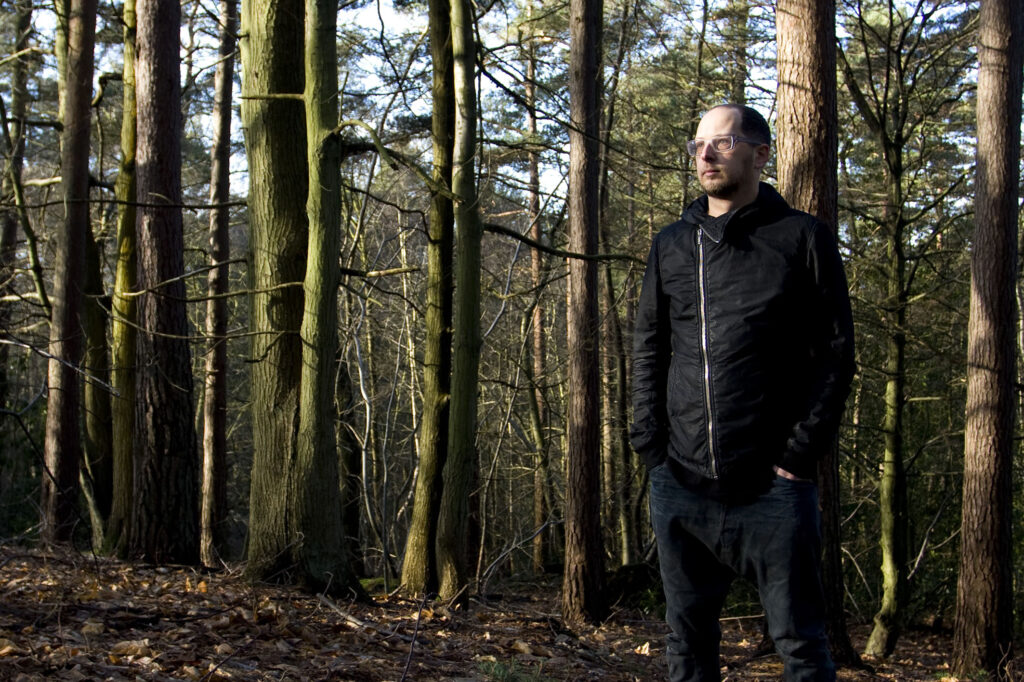
For a whole array of reasons, not least perhaps easy access to cheap technology and the spread of the internet, there’s more music around now than ever before. Not that it’s all worth listening to, of course.
“We still get sent lots of demos,” sighs Paradinas. “And the demos we get sent are, on average, more derivative and uninspired than the stuff we pick up on ourselves. We released the John Wizards album a couple of years ago, and then we got loads of afrobeat demos. We’re still getting a lot of footwork stuff, just because we were one of the first labels to popularise that in Europe. But we don’t want to hear a pale retread of what we’ve already released; we want to hear people who have their own musical ideas. You can tell when you listen to it if something has personality and passion, and I think recognising that is part of what running a label is about.”
In 2015, however, the very need for a record company seems open to question.
“Of course I think about that sort of thing and it concerns me, but I strongly believe there is a place for us,” declares Paradinas. “I don’t know how other people feel about listening to the amount of music that’s out there, but I think it’s pretty overwhelming. I need certain filters to find good music. And I think Planet Mu fulfils that function. The human brain likes brands, otherwise companies wouldn’t set up brands and be so protective of them. It’s a definite way for us to categorise things, so if Planet Mu can be associated with good electronic music then hopefully people will see it as a seal of approval, a mark of trust. They know that if they pick up a Planet Mu release, it’s going to be interesting.”
All of which being said, Paradinas is quick to assert that it doesn’t always go according to plan.
“Some of the records we’ve released haven’t gone well,” he concedes. “We put out a few Virus Syndicate records in the mid-2000s and they lost quite a lot of money. Looking back, it’s just because we spent so much on marketing, but I don’t really regret it. The decision about what music to release hasn’t changed, it’s just the amount you can spend on it. We can’t go overboard with advances and putting up fly posters like we did for one of the Virus Syndicate albums. Everyone’s thinking about where they can cut costs these days.”
So what would Paradinas say were the highlights from Planet Mu’s 20 years of releases? Does he have any personal favourite Planet Mu records?
“I can’t choose really, but there are releases I’m especially proud of, like DJ Nate’s ‘Da Trak Genious’ album from 2010. We found his music on YouTube in 2008 or 2009, and it took a long time, about a year, to find him and get a reply from him, and then to get the tracks off him and release them. I think it was a two year process to do that record.
“Kuedo’s ‘Severant’ album from 2011 is another one I’m very proud of. Again it took a long time to come together, but it became a classic record for me. Then there’s Venetian Snares, the ‘Rossz Csillag Alatt Született’ album from 2005. That’s another great album and that one came together really easily. It seemed to fall into place in an order which told a story and it sold well, as well as being really satisfying.”
Venetian Snares, aka Aaron Funk, has the distinction of getting the opportunity – like Paradinas did many years before at Hut – to set up a sub-label of his own. Timesig was launched in 2010, chiefly as a vehicle for Funk’s own music.
“He wanted to release stuff that we didn’t, basically. But each time we’ve put out a record of his, we’ve asked him if he wants it on Timesig or Planet Mu, and he’s said Planet Mu the last few times. I think if we ever do a Speed Dealer Moms album, though, it might be on Timesig.”
The wonderfully named Speed Dealer Moms are a trio of Funk, Chris McDonald from SKM-ETR, and ex-Red Hot Chili Peppers guitarist and electronic music convert John Frusciante.
“I keep asking Aaron to get an album together for me,” reveals Paradinas. “I know he’s got hours of that material done.”
Does Mike Paradinas have any advice he’d like to offer anyone who might be thinking about setting up a record label?
“Be rich,” is his quick response. “The longer answer is, if you look at a lot of labels that are around now, some of them have outside funding or are funded by independent wealth. And it’s likely that a label starting now will struggle unless you can pump money into it from time to time. But if you’ve got a passion for it, go ahead and do it. You’ll soon find out whether it’s selling or not and whether you can afford to do a second release. It’s a good way of working out how to run a business of any kind because it’s a simple model: you manufacture something, you sell it, and either you’ve got enough profit to do a second one or you haven’t. It’s really fucking simple!”
In spite of the headwinds, Paradinas maintains that running Planet Mu is fantastic fun.
“I can’t imagine another job I’d rather do,” he insists. “I enjoy it more than going on stage and playing my own stuff. I get really nervous playing live or DJing. Running a label isn’t a piece of piss, but it’s greatly enjoyable. There are so many different parts to the job and you’re doing something different every day, because you’re always dealing with different artists and each one has different personalities and challenges.”
As if to underline the point, he talks about a Venetian Snares record which he played to a group of people over 70 years of age when he was writing the press sheet, just to be able to see what their reaction to it was.
“That’s something you’d wouldn’t normally do in most jobs,” he rightly points out.
And the feedback?
“Everyone liked parts of it. Everyone liked the melodies but not the rhythms.”
The future of Planet Mu certainly looks set to be as busy and interesting as ever, with the recent second album from footwork pioneer RP Boo and a new Venetian Snares long-player in the works, which Paradinas says is being crafted using modular synths. He talks about how analogue synths seem to continually rotate back into vogue, something that’s happened numerous times in the two decades that Planet Mu has been in business.
“Some people really enjoy the process of using that sort of equipment,” he says. “If I had the opportunity, I probably would as well. If I spent all my time working as a musician, then I probably would have a bit more equipment. But I have very little time when I make music and I find that using Logic and a laptop allows me to maximise it. I really just enjoy having everything in one place so I can quickly get my ideas out and make music.”
For someone with a workload as heavy as Mike Paradinas, the clock is always against them. And as if to prove the point, Paradinas announces that he has to go. “Time is money,” he says as he departs, reinforcing his credentials as a hard-working label boss.


